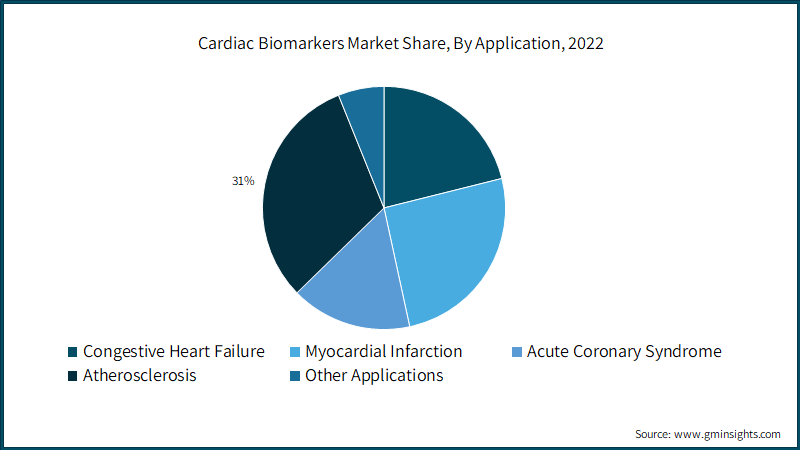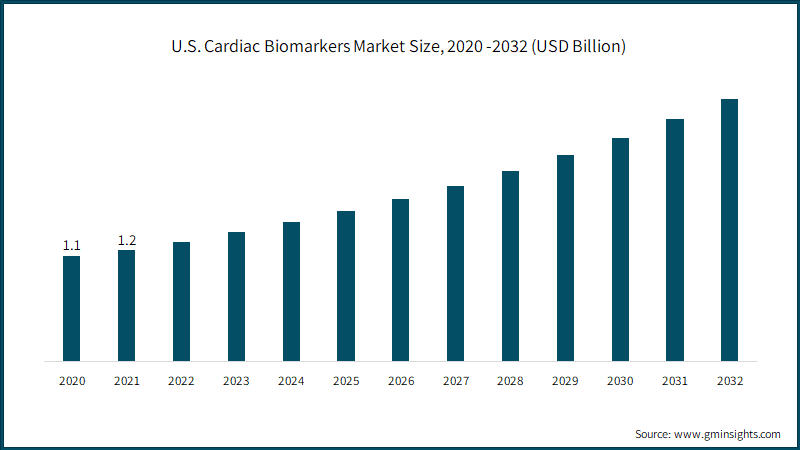Home > Healthcare > Medical Devices > Diagnostic Devices > Cardiac Biomarkers Market
Cardiac Biomarkers Market Analysis
- Report ID: GMI7121
- Published Date: Oct 2023
- Report Format: PDF
Cardiac Biomarkers Market Analysis
The market by product is categorized into troponins, creatine kinase-MB (CK-MB), myoglobin, natriuretic peptides, c-reactive protein (CRP), ischemia modified albumin. The troponins segment garnered USD 3 billion revenue size in the year 2022. Troponins are predominantly found in cardiac muscle and their specificity for cardiac injury reduces the risk of false positives, making them highly reliable indicators of heart damage.
- Troponins exceptional sensitivity and specificity for cardiac injury make them indispensable in the early detection of myocardial infarction, the monitoring of heart-related disorders, and risk assessment in cardiovascular healthcare.
- Advances in diagnostic technology have made it possible to conduct troponin testing at the point of care. This increased accessibility has driven demand, particularly in emergency departments.
Troponins are prominently featured in clinical guidelines for cardiac evaluation, enhancing their use in routine practice.

Based on application, the cardiac biomarkers market is segmented into congestive heart failure, myocardial infarction, acute coronary syndrome, atherosclerosis, and others. The atherosclerosis segment accounted for over 31% market share in the year 2022. High segment progression can be attributed to following factors as mentioned below;
- Cardiac markers have become valuable tools in atherosclerosis diagnosis, enabling the assessment of novel therapeutic approaches and monitoring treatment efficacy
- The integration of cardiac markers into atherosclerosis diagnosis represents a significant step in addressing atherosclerosis, ultimately improving patient outcomes, and contributing to more effective strategies for cardiovascular disease prevention.
The cardiac biomarkers market by end-use is categorized into hospital laboratory, point of care testing facilities, diagnostic facilities, and others. Hospital laboratory segment garnered USD 4.8 billion revenue size in the year 2022.
- Hospital laboratories play a crucial role in modern healthcare by providing in-vitro diagnostic services and supporting clinical decision-making. In addition to diagnosis, they continually monitor patients with heart-related conditions to assess treatment effectiveness and potential complications.
- The hospital collaborates closely with clinical teams to seamlessly integrate cardiac marker testing into patient care plans. Additionally, there is a need to manage costs and billing processes effectively, especially given the growing volume of cardiac marker testing.

U.S. cardiac biomarkers market accounted for USD 1.4 billion revenue size in 2022.
- As per CDC data, approximately 695,000 individuals suffered from heart disease in the U.S. in 2021, accounting for 1 out of every 5 deaths.
- Moreover, as healthcare systems adjust to meet the growing demand, cardiac markers continue to play an essential role in cardiovascular medicine, guaranteeing that patients receive the utmost standard of care for heart-related conditions. This is crucial in addressing the elevated mortality associated with cardiovascular diseases.

